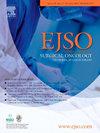食管癌和胃切除术后再入院位置对生存的影响。
IF 2.9
2区 医学
Q2 ONCOLOGY
引用次数: 0
摘要
背景:食管胃癌手术后的再入院给医疗保健系统带来了巨大的负担,并可能对患者的预后产生不利影响。虽然集中化改善了术后死亡率,但外围医院复杂并发症的管理问题仍然存在。本研究评估了食管切除术和胃切除术后90天内的再入院率,区分了指数(进行初次手术的医院)和非指数(周边医院)再入院率。次要目标包括确定再入院的危险因素和评估再入院地点对长期生存的影响。方法:对2011年至2024年接受食管切除术或胃切除术的患者进行回顾性单中心分析。主要结局为出院90天内的意外再入院。多变量logistic回归确定了再入院的危险因素。生存率分析采用Kaplan-Meier和Cox回归模型。结果:881例患者(食管切除术571例,胃切除术310例),再入院率分别为26.1%和24.2%。再入院的危险因素包括食管切除术的非严重吻合口瘘(OR 2.93; P = 0.004)和严重并发症(OR 2.19; P = 0.003),胃切除术的住院时间延长(OR 1.04; P)。虽然指数再入院的生存益处尚不清楚,但我们的研究结果强调了结构化术后护理对减轻术后发病率的重要性。进一步的研究应该确定在高等教育中心最好管理的并发症,以指导有针对性的再入院途径。本文章由计算机程序翻译,如有差异,请以英文原文为准。
Impact of readmission location on survival after oesophagectomy and gastrectomy
Background
Readmissions following oesophagogastric cancer surgery pose a substantial burden on healthcare systems and can adversely impact patient outcomes. While centralisation has improved postoperative mortality, concerns persist about the management of complex complications at peripheral hospitals. This study evaluates 90-day readmission rates following oesophagectomy and gastrectomy, distinguishing between index (hospital where primary surgery was performed) and non-index (peripheral hospital) readmissions. Secondary objectives include identifying risk factors for readmission and assessing the impact of readmission location on long-term survival.
Methods
A retrospective single-centre analysis was conducted on patients undergoing oesophagectomy or gastrectomy between 2011 and 2024. The primary outcome was unplanned readmission within 90 days of discharge. Multivariable logistic regression identified readmission risk factors. Survival analysis was conducted using Kaplan-Meier and Cox regression models.
Results
Of 881 patients (571 oesophagectomy, 310 gastrectomy), readmission rates were 26.1 % and 24.2 %, respectively. Risk factors for readmission included non-severe anastomotic leaks (OR 2.93; P = 0.004) and severe complications (OR 2.19; P = 0.003) for oesophagectomy, and prolonged hospital stay for gastrectomy (OR 1.04; P < 0.001). Protective factors included severe respiratory complications (OR 0.48; P = 0.024) and severe complications in gastrectomy patients (OR 0.33; P = 0.036). Index readmission was associated with improved survival on univariable analysis only.
Conclusion
Complication-readmission patterns vary by procedure type. While the survival benefit of index readmission remains unclear, our results highlight the importance of structured postoperative care to mitigate postoperative morbidity. Further research should identify complications best managed at tertiary centres to guide targeted readmission pathways.
求助全文
通过发布文献求助,成功后即可免费获取论文全文。
去求助
来源期刊

Ejso
医学-外科
CiteScore
6.40
自引率
2.60%
发文量
1148
审稿时长
41 days
期刊介绍:
JSO - European Journal of Surgical Oncology ("the Journal of Cancer Surgery") is the Official Journal of the European Society of Surgical Oncology and BASO ~ the Association for Cancer Surgery.
The EJSO aims to advance surgical oncology research and practice through the publication of original research articles, review articles, editorials, debates and correspondence.
 求助内容:
求助内容: 应助结果提醒方式:
应助结果提醒方式:


